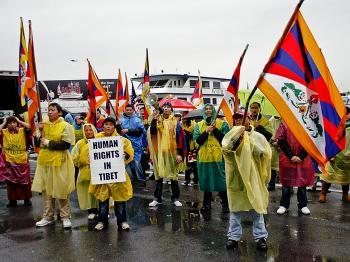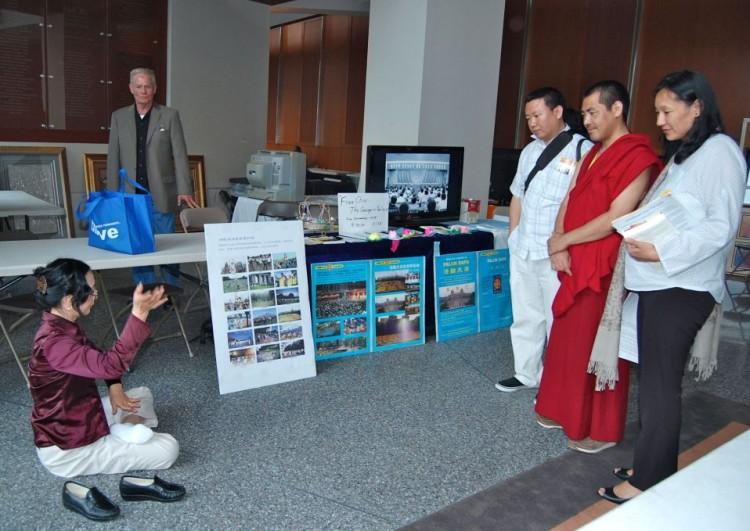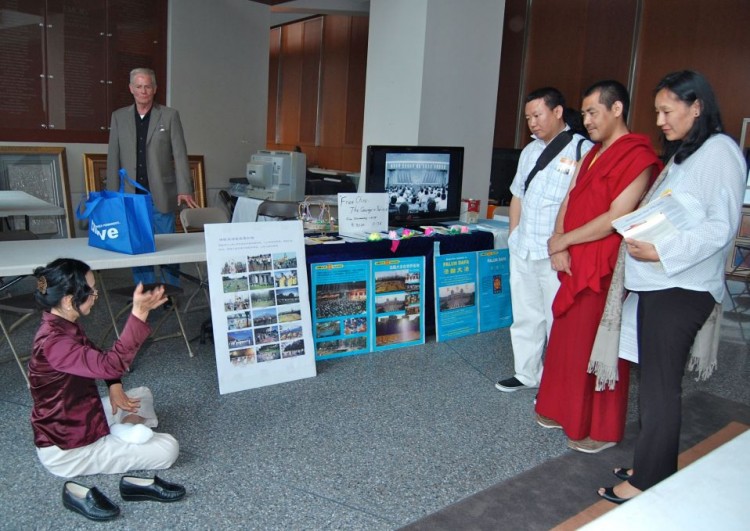Following the atrocities of World War II, the world said, “Never again,” and on December 10, 1948, the Universal Declaration of Human Rights was created to help ensure that the crimes against humanity that took place under the rule of the Nazis would never be seen again. That day was marked as the International Human Rights Day.
Tsering Palden, joint secretary of the Regional Tibetan Youth Congress said that they had marched to the UN to call for China to respect human rights. “China is one of the members of the UN, so China has a big responsibility to respect this declaration and the principles set by the UN. China is violating almost every article in this declaration, so we want the UN to force China to abide by their principles,” said Palden.
The CCP infiltrated Tibet in 1959, killing 1.2 million Tibetans in the process, and the Dali Lama, the spiritual leader of the Tibetans, was forced into exile. Tibet has been occupied by the CCP ever since and Tibetans have taken the initiative to peacefully call for a free Tibet.
Under the atheist rule of the CCP, the religious practices of the Tibetans have been tightly controlled explained Palden. “In the monasteries where the Tibetans practice and learn their religion, now [the CCP] have introduced what they refer to as their tradition,” he said. “It’s a campaign to brainwash Tibetan monks and nuns to become [supportive] to the communist regime. People are forced to praise the communist party and to denounce the Dali Lama.”
In addition to the exile of the Dali Lama in 1995, the CCP placed the Panchen Lama, Gedun Choekyi Nyima, under house arrest, and his whereabouts remain unknown. Palden explained that in Tibet, the Dali Lama is believed to be a “living Buddha,” and in their tradition, tracing the reincarnation of living Buddhas to their next life is regarded as being extremely important.
“But now, last year, China has passed a law, where when a Tibetan wants to recognize the reincarnation of a living Buddha, they have to apply for permission from the central government, which doesn’t make sense at all because China is atheist,” he said.
The CCP’s new law on reincarnation may have been enacted so that the regime can hold who the Tibetans believe to be the next incarnation of the Buddha in captivity, just as they are currently doing with many other religious leaders in Tibet.
Leading up to the 2008 Beijing Olympics, the CCP again tightened its grip on the Tibetan people in preparation for its hosting of the Summer Games. All media was cut off from the country and an estimated 209 Tibetans were killed, over 1,000 injured, and more than 5,714 were arrested. Following the Olympics, there has been little word from inside Tibet.
Sonam Wangchu, president of the Regional Tibetan Youth Congress, explained that in light of the persecutions by the CCP, the Tibetan people will continue to protest peacefully. “Since our struggle is non-violent, we know it will take time. But we feel that people of the free world will listen to it and start realizing that it’s not just in Tibet. It’s Chinese people themselves who are also suffering under their government,” Wangchu said.
“Human Rights Day is actually a day that stands for the right to be free, the right to be equal, and to the chance to have a good life,” said Wangchu. “That’s why they made the Universal Declaration of Human Rights in 1948. 60 years and it’s still going on. It’s going on all over the world, including in Tibet.”







